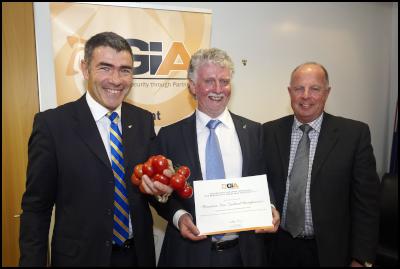Tomato industry signs Agreement on biosecurity
Tomato industry signs Government Industry Agreement on biosecurity

Tomatoes New Zealand Incorporated today signed the Deed of the Government Industry Agreement (GIA) for Biosecurity Readiness and Response at Parliament with the Hon Nathan Guy, Minister for Primary Industries in attendance.
“The signing of the GIA Deed is an important step to securing the future growth of our industry,” said Alasdair MacLeod, Chair of Tomatoes New Zealand which represents New Zealand’s 149 commercial fresh tomato growers.
“New Zealand’s tomato industry has an ambitious goal to double in value, from $100m to $200m, by 2020. Biosecurity incursions are our biggest threat to achieving that. With growing numbers of tourists to our shores and a warming climate, it’s now more likely than ever before that foreign pests will establish themselves in New Zealand,” said Mr MacLeod.
There are many tomato pests, viruses and diseases impacting on tomato production overseas that have the potential to have a major impact on production here if they were to arrive. For example, the arrival in 2006 of Tomato Potato Psyllid (TPP) costs the tomato industry an estimated $761,000 annually in control costs, lost production and increased compliance.
“The best way to protect New Zealand’s horticulture industry is through excellent border security, strong preparation for possible incursions and a rapid response when unwanted pests do arrive, to eradicate them quickly and effectively.
“Tomatoes New Zealand recognised early on that becoming a signatory to the GIA Deed would benefit fresh tomato growers by giving us a seat at the table with government and a greater say in preparing for and managing biosecurity risks specific to our industry.”
GIA Secretariat Manager Steve Rich agreed, saying he was pleased that the tomato sector hasrecognised the benefits of joining with industry and government and seeing how this can deliver better outcomes.
“Tomatoes New Zealand joins the growing number of industry groups prepared to take responsibility to manage biosecurity risks within their sector. GIA offers value in terms of working together to maximise the collective strengths of the partnership,” said Mr Rich.
The tomato industry is New Zealand’s second largest vegetable sector, equal to onions, worth $118m at the farm gate. Approximately 42,000 metric tonnes are grown mainly in 120 hectares of greenhouses, predominantly in the regions of Auckland/Waikato, Central North Island, Nelson/Marlborough and Christchurch.
ENDS
About Tomatoes NZ
Inc
Tomatoes NZ Inc is the representative for
the commercial fresh tomato industry. New Zealand’s 149
growers grow an estimated 42,000 tonnes of tomatoes which it
sells largely to the domestic market. Exports were worth
$10.17m in the year to March 2016, an increase of over $2m
on the previous year. The tomatoes are predominately grown
in about 120ha of glass and plastic houses.
www.tomatoesnz.co.nz
About the Government Industry Agreement (GIA) for Biosecurity Readiness and Response
The GIA for Biosecurity Readiness and Response operates as a partnership between industry and government to manage pests and diseases that could badly affect New Zealand's primary industries, our economy, and our environment. It aims to improve biosecurity outcomes and give everyone the confidence that the best decisions are being made.
www.gia.org.nz


 Ngā Pae o te Māramatanga: Māori Concerns About Misuse Of Facial Recognition Technology Highlighted In Science
Ngā Pae o te Māramatanga: Māori Concerns About Misuse Of Facial Recognition Technology Highlighted In Science Retail NZ: Retailers Call For Flexibility On Easter Trading Hours
Retail NZ: Retailers Call For Flexibility On Easter Trading Hours WorkSafe NZ: Worker’s Six-Metre Fall Prompts Industry Call-Out
WorkSafe NZ: Worker’s Six-Metre Fall Prompts Industry Call-Out PSGR: Has MBIE Short-Circuited Good Process In Recent Government Reforms?
PSGR: Has MBIE Short-Circuited Good Process In Recent Government Reforms? The Reserve Bank of New Zealand: RBNZ’s Five Year Funding Agreement Published
The Reserve Bank of New Zealand: RBNZ’s Five Year Funding Agreement Published Lodg: Veteran Founders Disrupting Sole-Trader Accounting in NZ
Lodg: Veteran Founders Disrupting Sole-Trader Accounting in NZ



